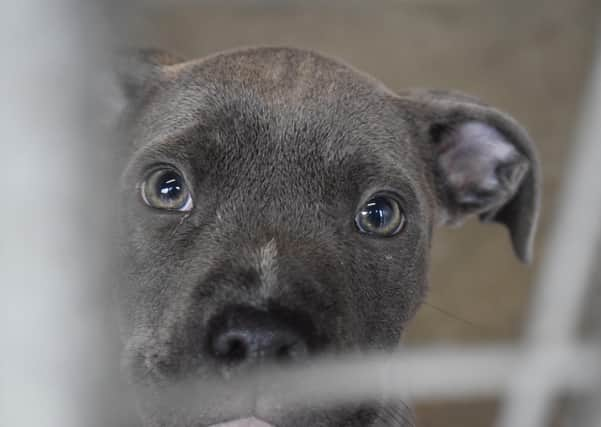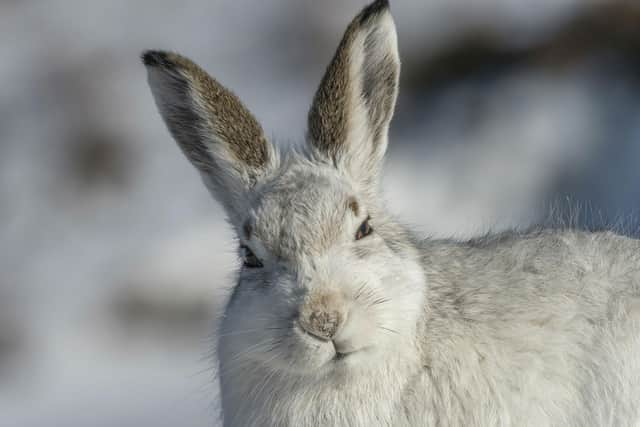Scotland to introduce five year jail term for animal cruelty


MSPs have supported increased penalties for the worst animal cruelty cases.
And Finn’s Law will also give new legal protections for service animals such as police dogs and horses, removing a legal defence of self-defence for attacks on service animals in the course of their duties.
Advertisement
Hide AdAdvertisement
Hide AdThe Animals and Wildlife (Scotland) Bill will increase the maximum penalty for the worst animal cruelty crimes to five years imprisonment and an unlimited fine.


Animal welfare enforcement agencies will also be given innovative new powers, allowing animals taken into their care to be quickly rehomed – without the need for a court order.
Mairi Gougeon, Rural Affairs Minister, said: “This Bill is an important milestone in Scotland’s long tradition of protecting our animals and wildlife.
“The increased maximum available penalties reflect the seriousness of some of the very cruel crimes seen against domestic and wild animals, although these cases are, thankfully, rare.
Advertisement
Hide AdAdvertisement
Hide Ad“Finn’s Law, named after a police dog brutally injured in the course of its duties, recognises the important role service animals play in protecting us in sometimes very difficult circumstances.


“The Bill also provides new powers, described as ‘transformative’ by the SSPCA, that will allow animal welfare enforcement agencies to quickly rehome animals in their care.”
The Scottish Society for the Prevention of Cruelty to Animals welcomed the government’s decision.
Scotland’s animal welfare charity, which is reponsible for investigating animal cruelty and rehoming animals seized on welfare grounds, said the law will be game-changing for both animals and the organisation.
Advertisement
Hide AdAdvertisement
Hide AdThe Bill will increase the maximum sentence for the worst animal cruelty or wildlife crime offences from one year to five and/or an unlimited fine.
Kirsteen Campbell, SSPCA chief executive, said: “It is a momentous day for animal welfare in Scotland.
“The proposals, which will be enshrined in law, will deliver wholesale, transformational change for animals nationwide.
“Every day the SSPCA experiences first hand how existing legislation can fail animals and we’ve long campaigned for many of the reforms in this Bill.
Advertisement
Hide AdAdvertisement
Hide Ad“The inconsistency of sentences handed out to those guilty of animal cruelty has long been a frustration.
“We are hopeful increased sentencing and unlimited fines will act as a greater deterrent to people in mistreating animals and ensure the punishments befit the crime for the worst offences, such as animal fighting and puppy farming.”
The Bill will also remove the need for the SSPCA to obtain a court order to rehome an animal involved in legal proceedings which has not been signed over in to its care.
In 2019, the society spent more than £650,000 providing refuge to animals caught up in such situations.
Advertisement
Hide AdAdvertisement
Hide AdOn average, these animals spent 203 days in the charity’s care. Under the new law, these animals could be rehomed after three weeks, subject to veterinary advice.
Kirsteen said: “At the moment, any animal involved in legal proceedings cannot be rehomed unless it is signed over in to our care or we obtain a court order.
“On average, an animal caught up in such a situation spent 203 days – almost seven months – in one of our rescue centres before being rehomed. Now, we’ll be able to rehome these animals within weeks.
“This will free up space in our centres for more animals in need. We have spent more than £2.1 million providing refuge to these animals since 2016 so this will bring us signficant cost savings.
Advertisement
Hide AdAdvertisement
Hide Ad“Most importantly it is in the best interests of every single animal we are able to rehome faster because, despite the first class care and attention of our great team, a rescue centre is not a long-term substitute for a loving home.”
An independently-chaired taskforce will also start work this summer to consider whether the SSPCA should be given extra powers to investigate wildlife crime, following a Scottish Government commitment on the issue during Parliament’s consideration of the Bill.
Kirsteen added: “We welcome the Scottish Government’s pledge to set-up an independent taskforce to explore the potential to extend our powers to allow us to investigate wildlife crime.
“We have a nationwide network of inspectors with the expertise to do this who would gladly take up the opportunity to help even more animals.
Advertisement
Hide AdAdvertisement
Hide Ad“We also welcome the commitment to commission research into empathy training as part of restorative justice and look forward to being part of this inititiave.”
Opposing views on protection of mountain hares
A late amendment to the Bill means a licensing system will be introduced for the killing of mountain hares.
Scottish Green MSP Alison Johnstone lodged Amendment 30 last week and it was supported by the government.
This means that, once the Bill passes into law, it will be an offence intentionally or recklessly to kill, injure or take a mountain hare without a specific licence.
Advertisement
Hide AdAdvertisement
Hide AdThe move has been met with opposing views from a range of organisations in Scotland.
Kirsteen Campbell, chief executive of the SSPCA, said: “The only circumstances under which the SSPCA will accept mass killing or culls of any species is when it is in the interests of the wider health of the species or a serious threat to human health or safety.
“Bloodsport is no excuse for the widespread slaughter of any animal and that includes those who slaughter mountain hares to boost estate income.”
Bob Elliot, director of OneKind animal protection charity, agreed, saying: “The upsurge in public support has been momentous. OneKind is delighted to see a successful conclusion to one of our most heartfelt campaigns.”
However, not everyone has welcomed the decision.
Advertisement
Hide AdAdvertisement
Hide AdAlex Hogg, chairman of The Scottish Gamekeepers Association, said: “A grave mistake has been made.
“This is a bad law, made by people it will not impact upon.
“There will be no satisfaction in turning around in a few years and saying: ‘we told you so’.”
And Sarah-Jane Laing, chief executive of Scottish Land and Estates, said: “We are extremely disappointed that the Scottish Parliament has voted for sweeping changes to regulations covering the control of mountain hares.
“Mountain hares are thriving on Scotland’s moors and their fate will not be improved by this vote.
Advertisement
Hide AdAdvertisement
Hide Ad“There is clear evidence the control of hares helps combat Lyme disease and protects plants and young trees.
“Balanced wildlife management is key to meeting Scottish Government targets on tree planting. It is disappointing that this seems to have been disregarded.”